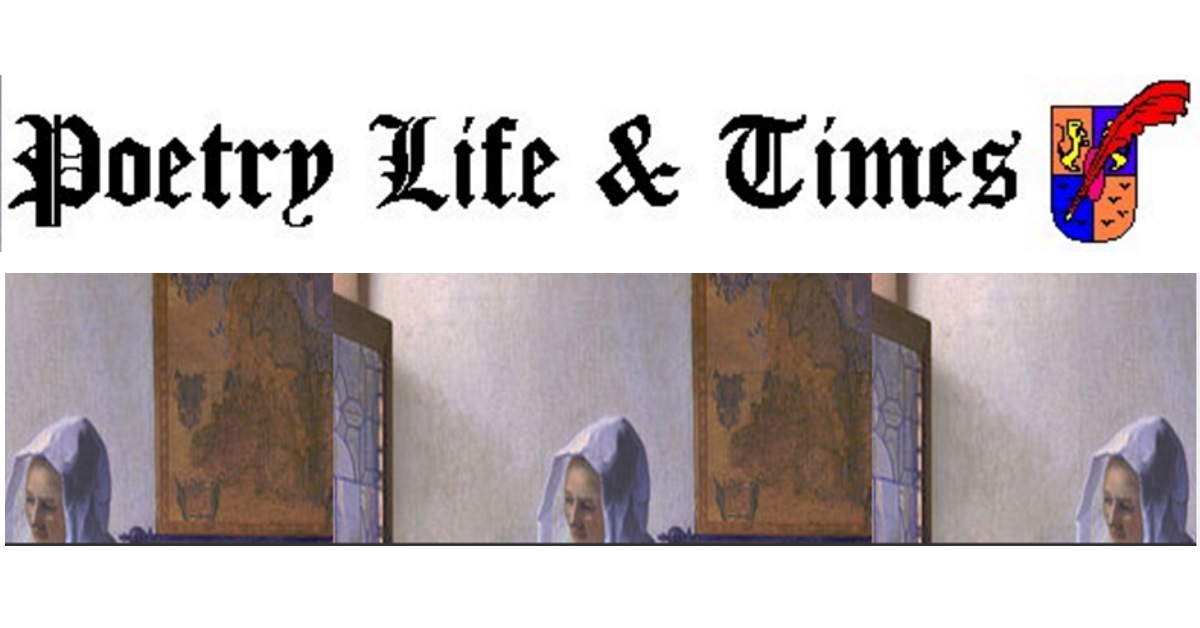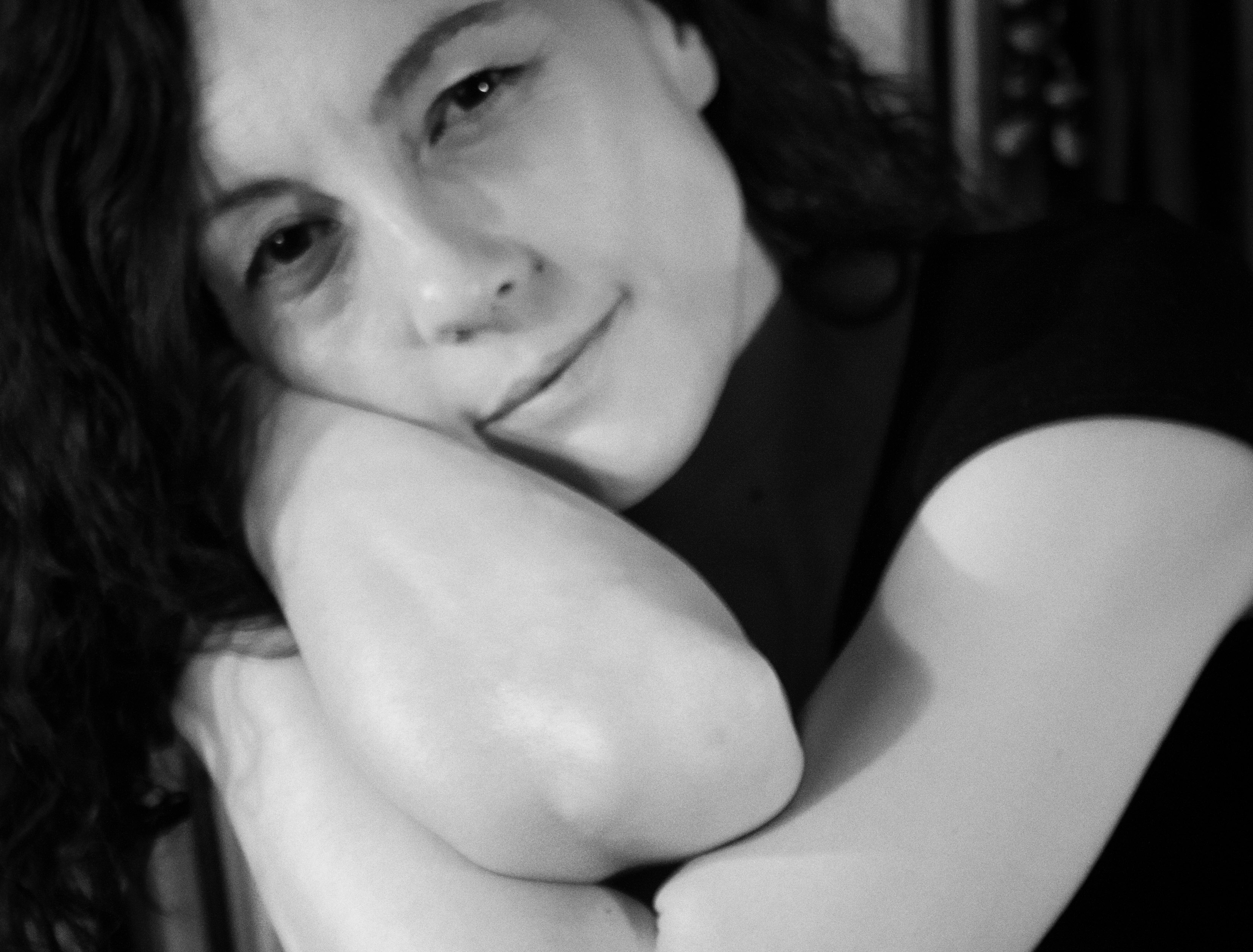Cover Image. Water. Teresa Fisher.
Editor’s Note: This video poem was originally contributed by Ian to take part in a You Tube Poets Documentary to be Edited & Published by Sara Russell http://poetrylifetimes.blogspot.co.uk we are taking further submissions in case of interest contact Robin@Artvilla.com.

Ian Irvine (Hobson) is an Australian-based poet/lyricist, fiction writer and non-fiction writer. His work has featured in publications as diverse as Humanitas (USA), The Antigonish Review (Canada), Tears in the Fence (UK), Linq (Australia) and Takahe (NZ), among many others. His work has also appeared in two Australian national poetry anthologies: Best Australian Poems 2005 (Black Ink Books) and Agenda: ‘Australian Edition’, 2005. He is the author of three books and co-editor of a number of literary journals – Scintillae 2012, The Animist ezine (7 editions, 1998-2001) and Painted Words (10 editions 2005-2014). He coordinates the Professional Writing and Editing program at Bendigo Kangan Institute (Bendigo & Melbourne, Australia) and has taught in the same program at Victoria University, St. Albans, Melbourne. He has also taught history and social theory at La Trobe University (Bendigo, Australia) and holds a PhD for his work on creative, normative and dysfunctional forms of morbid ennui. Web site: http://www.authorsden.com/ianirvine
www.facebook.com/PoetryLifeTimes
www.facebook.com/Artvilla.com
robin@artvilla.com
editor@artvilla.com
Key of Mist. Guadalupe Grande.Translated.Amparo Arróspide.Robin Ouzman Hislop
goodreads.com/author/show/Robin Ouzman Hislop
http://www.aquillrelle.com/authorrobin.htm
http://www.amazon.com. All the Babble of the Souk. Robin Ouzman Hislop
www.lulu.com. All the Babble of the Souk. Robin Ouzman Hislop
https://www.amazon.com/author/robinouzmanhislop
http://www.innerchildpress.com/robin-ouzman-hislop.All the Babble of the Souk
Poetry Life & Times
Nominated for the Push Cart Prize. Africa North. A Poem by Robin Ouzman Hislop
Africa North is an excerpt from the collected poems All the Babble of the Souk. Robin Ouzman Hislop
Solstice winds, rain return in spells
a moon waxes full, dogs howl as well.
All the babble of the Souk
men over there, over there women.
All the life of the planet
so little part of it that i breathe.
Weather beaten highlands, once passed through.
The river bed, no more like a parched bone
its late autumnal river meanders as a vein
past four reservoirs
a quest that will end in winter´s flood.
Between them are momentary mists
where brightly clad figures of the north, suddenly dim.
On the frontier’s beach taxis come, go
only the stranded remain, together with the seagulls
four men huddled, drenched in pouring rain
dead once more, again, all pathways home
washed away, again. A broken song
Remember me, sung in a doorway
brings the world at large together
as suddenly as it narrows.
~
Water runs on marble
nakedness revealed, nakedness concealed
form water words, water memories, mists, fates.
Veins wrestle the marble into mangled knots
blemished pearls on an implacable skin
shards leaving fragmentary traces
empty spaces awaiting faces.
Lights dance in the night, picturesque
“casas blancas del pueblo”
appear through the darkness
as the brush strokes of my mind steal the action of the shadow.
Mists cordon the mountain tops
guerdoned crowns like wreathes.
Ancient fields’ still colours surrounded
by burgeoning new lead to the valley below.
Old women, old as aglow, so slow they go
poised aloof in an untouchable world, trapped.
High in kiln firelight they cowl night’s shade
to oversee goats on the hill beneath.
Daughters of necessity naked in the rock
unleashed in white trefoil in the marsh
swamp of night rain, stark where epochs
sleep in their shadows.
Replication of memories, where the old
becomes the new, a world splits in two
with Morpheus in the breach.
Beyond control, beyond reach the erratic butterfly
flits bloom to bloom, the intrepid stalker with net
both captured in the mimic mould.
A knot is tied, a knot that wrestles
embraces, that ravels birth
unravels death & binds its existence.
~
Her face is as if a moon glazed over
with a less serene ceramic dust that in the end
after its perplexity contains its surety.
She draws her forefinger laterally across
under her eye lid in a smear
nor can you change the image of what you are
in the pupil of her eye.
Babble bodies blur
voices with their echoes down the street
sky high, prices fly
a bird song breaks, a splash charade.
Faces in the rain thin
weakness of watery years.
A winnowing canvass tosses corn
as fireflies in the blazing day.
The hag in her rags begs her bag
holding all shadows to account.
You sit in the solitary corner
at the empty dice board
to throw, as the music swells, as strings play.
On the washing line clothes of all shapes
sizes are waiting to be filled
suspended between earth, sky, where white sheets blow.
A twinge of nostalgia flashes
a link between a fluttering curtain
an open window frame, a sun shadow game
a flickering apparition pattern leaving only – strands.
A breeze flutters an open foolscap on the table
as though a phantom reader
should flick with regard through a score of notes
then stops at the first blank white sheets
stays, the moving hand that wrote, wrote no more.
~
On record, old honky-tonk goes on
amidst the heaps of consumer city sneakers
in the same dust where faces
turn from their spring red lustre to a sun soiled wear
Through a beehive of alleys
names, aye to fetch them home again
as if where the countless dead resided, you’d said
in a market of women shrouded in shawls.
~
Berlin falls, Baghdad falls
all the years turn to further tears
further fears to merge with your voyage
the shape of dreams to come
to be only endearments of what has gone before.
A flower opens after a thousand years in a shell of tears
indifferent to its beholders’ sight
who paint it with the colours from the waters of their night
on an unknown shore, to whose sight it opened once before.
Children’s faces like radiant imps
play carefree in the streets below
overhead on red tiles, fat pigeons bicker, coo.
In an internet cafe, an Arab girl discrete in headdress
plays with cartoon molecules of Mickey Mouse
Koala bear
nubile women’s faces dream of nudity in their shrouds.
Wonky pinz nez specs, jumble sale clothes
bad teeth, unshaven grin
looking a faded duplicate of a down
out James Joyce with the come on
are you Irish, he asks
perhaps he was once upon a time.
~
They came through the cleft of the mountain
– where the river ran
to swim as a blur in the naked purple of the eye.
On the mountain face there is a scar
once a sacred place, now extinct, as they are.
Yet wild still she runs, amidst the sheep, goats
toils at the hearth, dutifully bears children
yesterday she knows but not tomorrow
where she hides her sorrow.
Even as he ploughs the hillside
a photo will steal his soul, but his beasts will do.
~
Twilight’s girls, girls, girls
throng the bustling street corners eating caracoles.
By day the olive tree green in the blue sky of the window
seems almost immortal enriched with the blood
it’s enriched, now at its roots.
Costa de la playa, white beehives in the sun, all money, no honey.
In the broken lights of the bazaar
the dusky eyes of the beggar sunk in their sockets
maze in crooked cul de sacs embargo amidst
the furls of silk that foil the flickering lantern niche.
In the gloaming a solitary reaper reaps its shadow.
Streets packs ravage carcasses
at dawn, the city wakes to the city’s obedience
to obey its disappearing shadows.
A ghost city of watchers
watched as shadows by a memory that has outlived them
now fragments in an admixture of old, new
amidst a junk yard of rubble
watcher shadows phased captive to their fading stories.
The street’s mechanics of the day
obey their limits, patterns of parts
where we end only to start in a series of nows.
Post mortem of the world at large
an autopsy of ghosts on the slab.
Born to see, in the boutiques people seem
like their own mannequins
existence is a mystery with no purpose
-
only we endow it with a destiny, it does not seek from us.
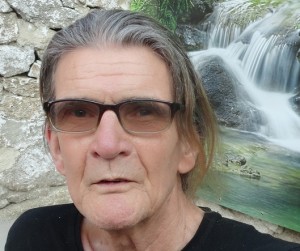
Robin Ouzman Hislop
is on line Editor at Motherbird.com, Artvilla.com & Poetry Life & Times, his recent publications include Voices without Borders Volume 1 (USA), Cold Mountain Review (Appalachian University, N.Carolina), The Poetic Bond Volumes, Phoenix Rising from the Ashes (an international anthology of sonnets) and The Honest Ulsterman.
His last publications are a volume of collected poems All the Babble of the Souk & Key of Mist, a translation from Spanish of the poems by the Spanish poetess Guadalupe Grande, both are published by Aquillrelle.com and available at all main online tributaries. For further information about these publications with reviews and comments see Author Robin..
www.facebook.com/PoetryLifeTimes
www.facebook.com/Artvilla.com
robin@artvilla.com
editor@artvilla.com
Key of Mist. Guadalupe Grande.Translated.Amparo Arróspide.Robin Ouzman Hislop
goodreads.com/author/show/Robin Ouzman Hislop
http://www.aquillrelle.com/authorrobin.htm
http://www.amazon.com. All the Babble of the Souk. Robin Ouzman Hislop
www.lulu.com. All the Babble of the Souk. Robin Ouzman Hislop
https://www.amazon.com/author/robinouzmanhislop
http://www.innerchildpress.com/robin-ouzman-hislop.All the Babble of the Souk
Nominated for the Push Cart Prize. Key of Mist. A Poem by Guadalupe Grande. Translated from Spanish.
Key of Mist is an excerpt from the collected poems Key of Mist
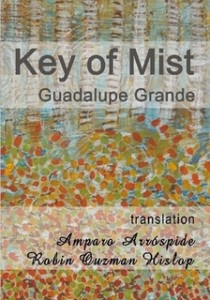 KEY of MIST
KEY of MIST
I
Behind the fence there´s a ditch
and behind the ditch
there´s a chest devastated by the journey.
Who arrives here and how
and after perhaps?
Who arrives and says and names
and leaves their hands stuck to this fence
as stamps are stuck to envelopes,
to return where
to return to then
to return to later, never again?
The compass rose rolls amongst the rubble,
rolls on the banks of gravel,
on the edge of ash,
and leaves its petals of distance,
its shipwreck of durum-wheat and pollen,
beneath the wheels of the car which has just passed.
Time for the word time
amidst the rubble of the tower of babel.
II
But now there´s the ditches:
water ditches
light ditches
gas ditches
ditches for words.
I am spelling
while telling myself
that it can´t be today,
that there is too much rush,
that life´s a disaster
or nonsense
or a useless disquiet,
and due to that, today there´s no time:
time for nothing, time for what.
III
I open the door, switch on the light,
turn on the tap:
I´d like to know whom to call.
The sound of traffic enters through the window;
I hear the rumours of travellers
I listen to the sound of the inhabitants
and builders
of this language without words.
IV
I speak in gurgles
as if a key of mist
were laid across my throat,
a key fogged up by noise,
a key flooded by light,
a gas key
a water key
a doorless key,
a definitely shadowy key
buried inside my throat,
in the ditch of my bewildered throat.
V
Behind each fence there is a ditch,
behind each ditch there is a journey.
The compass rose crosses
the city tunnels:
from its smoky petals it brings
forth mossy farewells,
the empire of forget-me-nots,
paper for unwritten letters,
humiliated stamps
and a devastated chest in the building
of music
or language
or city noise.
Under the asphalt of these roads
the tower of babel grows
sad and useful.
VI
I turn on the tap in the kitchen and while water runs through the sink I wonder which words this thread of order and cleanliness is spelling, which key I should switch to, to understand the language of fences, the language of ditches, the underground sound of migrating birds opening without any key this city´s gates, without a key, at last, at last.
LA LLAVE DE NIEBLA
I
Detrás de la valla hay una zanja
y detrás de esa zanja
hay un pecho desolado en el viaje.
¿Quién llega hasta aquí y cómo
y luego tal vez?
¿Quién llega y dice y nombra
y deja sus manos pegadas a esta valla,
como se pegan los sellos a las cartas,
para volver a dónde
para volver a entonces
para volver a luego nunca más?
Rueda la rosa de los vientos por los escombros,
rueda a la orilla de la grava,
al borde de la ceniza,
y deja sus pétalos de distancia,
su polen náufrago y candeal,
bajo las ruedas del coche que acaba de pasar.
Tiempo para la palabra tiempo
entre los escombros de la torre de babel.
II
Pero ahora están las zanjas:
zanjas de agua,
zanjas de luz,
zanjas de gas,
zanjas para las palabras
que pronuncio
mientras me digo
que hoy no puede ser,
que hace mucha prisa,
que la vida es un desastre
o un disparate
o un desasosiego inútil,
debido a lo cual hoy no hay tiempo:
tiempo para nada, tiempo para qué.
III
Abro la puerta, enciendo la luz,
abro el grifo:
quisiera saber a quién llamar.
Entra el sonido del tráfico por la ventana;
oigo el rumor de los viajeros,
escucho el sonido de los habitantes
y de los constructores
de este idioma sin palabras.
IV
Hablo a borbotones,
como si tuviera una llave de niebla
atravesada en la garganta,
una llave empañada por el ruido,
una llave anegada por la luz,
una llave de gas,
una llave de agua,
una llave sin puerta,
una llave definitivamente umbría,
enterrada en mi garganta,
en la zanja de mi desconcertada garganta.
V
Detrás de cada valla hay una zanja,
detrás de cada zanja hay un viaje.
La rosa de los vientos cruza
los túneles de la ciudad:
trae entre sus pétalos de humo
el musgo de las despedidas,
el imperio de los nomeolvides,
papel para cartas no escritas,
humillados sellos
y un pecho desolado en la construcción
de la música
o el lenguaje
o el ruido de la ciudad.
Bajo el asfalto de estas calles
crece la torre de babel
triste y útil.
VI
Abro el grifo en la cocina
y mientras corre el agua por el fregadero
me pregunto qué palabras pronuncia
este hilo de orden y limpieza,
qué llave debo abrir para entender
el lenguaje de las vallas, el idioma
de las zanjas,
el sonido subterráneo
de las aves migratorias
que abren sin llave alguna las puertas de esta ciudad,
sin llave,
por fin,
por fin.
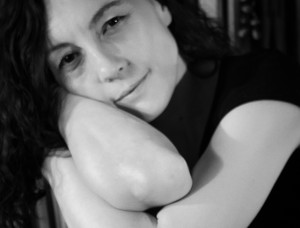
GUADALUPE GRANDE
Madrid, 1965.
She has written the following books of poetry: El libro de Lilit (1995), La llave de niebla (2003), Mapas de cera (2006) and Hotel para erizos (2010).
She has been translated into French in the book Métier de crhysalide (translation by Drothèe Suarez and Juliette Gheerbrant (2010) and into Italian, in the volume Mestiere senza crisalide (translation by Raffaella Marzano (2015). She made the selection and translation of La aldea de sal (2009), an anthology of Brazilian poet Lêdo Ivo, together with poet Juan Carlos Mestre.
Her creative work extends to the territory of photography and visual poetry.http://guadalupegrande.blogspot.com.es/
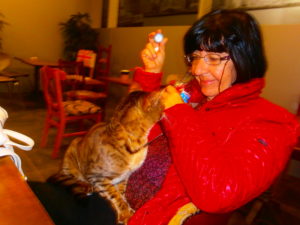
Amparo Arróspide (Argentina) has published five poetry collections: Presencia en el Misterio, Mosaicos bajo la hiedra, Alucinación en dos actos y algunos poemas, Pañuelos de usar y tirar and En el oído del viento, as well as poems, short stories and articles on literature and films in anthologies and international magazines. She has translated authors such as Francisca Aguirre, Javier Díaz Gil, Luis Fores and José Antonio Pamies into English, together with Robin Ouzman Hislop, who she worked with for a period as co-editor of Poetry Life and Times, a Webzine. Her translations into Spanish of Margaret Atwood (Morning in the Burned House), James Stephens (Irish Fairy Tales) and Mia Couto (Vinte e Zinco) are in the course of being published, as well as her two poetry collections Hormigas en diáspora and Jacuzzi. She takes part in festivals, recently Transforming with Poetry (Leeds) and Centro de Poesía José Hierro (Getafe).

Robin Ouzman Hislop is on line Editor at Motherbird.com, Artvilla.com & Poetry Life & Times, his recent publications include Voices without Borders Volume 1 (USA), Cold Mountain Review (Appalachian University, N.Carolina), The Poetic Bond Volumes, Phoenix Rising from the Ashes (an international anthology of sonnets) and The Honest Ulsterman. His last publications are a volume of collected poems All the Babble of the Souk & Key of Mist, a translation from Spanish of the poems by the Spanish poetess Guadalupe Grande, both are published by Aquillrelle.com and available at all main online tributaries. For further information about these publications with reviews and comments see Author Robin..
www.facebook.com/PoetryLifeTimes
www.facebook.com/Artvilla.com
robin@artvilla.com
editor@artvilla.com
Key of Mist. Guadalupe Grande.Translated.Amparo Arróspide.Robin Ouzman Hislop
goodreads.com/author/show/Robin Ouzman Hislop
http://www.aquillrelle.com/authorrobin.htm
http://www.amazon.com. All the Babble of
Announcement. Collected Poems. Key of Mist. Translated from Spanish

GUADALUPE GRANDE
Madrid, 1965.
She has written the following books of poetry: El libro de Lilit (1995), La llave de niebla (2003), Mapas de cera (2006) and Hotel para erizos (2010).
She has been translated into French in the book Métier de crhysalide (translation by Drothèe Suarez and Juliette Gheerbrant (2010) and into Italian, in the volume Mestiere senza crisalide (translation by Raffaella Marzano (2015). She made the selection and translation of La aldea de sal (2009), an anthology of Brazilian poet Lêdo Ivo, together with poet Juan Carlos Mestre.
Her creative work extends to the territory of photography and visual poetry.http://guadalupegrande.blogspot.com.es/

Amparo Arróspide (Argentina) has published five poetry collections: Presencia en el Misterio, Mosaicos bajo la hiedra, Alucinación en dos actos y algunos poemas, Pañuelos de usar y tirar and En el oído del viento, as well as poems, short stories and articles on literature and films in anthologies and international magazines. She has translated authors such as Francisca Aguirre, Javier Díaz Gil, Luis Fores and José Antonio Pamies into English, together with Robin Ouzman Hislop, who she worked with for a period as co-editor of Poetry Life and Times, a Webzine. Her translations into Spanish of Margaret Atwood (Morning in the Burned House), James Stephens (Irish Fairy Tales) and Mia Couto (Vinte e Zinco) are in the course of being published, as well as her two poetry collections Hormigas en diáspora and Jacuzzi. She takes part in festivals, recently Transforming with Poetry (Leeds) and Centro de Poesía José Hierro (Getafe).

Robin Ouzman Hislop is on line Editor at Motherbird.com, Artvilla.com & Poetry Life & Times, his recent publications include Voices without Borders Volume 1 (USA), Cold Mountain Review (Appalachian University, N.Carolina), The Poetic Bond Volumes, Phoenix Rising from the Ashes (an international anthology of sonnets) and The Honest Ulsterman. His last publications are a volume of collected poems All the Babble of the Souk & Key of Mist, a translation from Spanish of the poems by the Spanish poetess Guadalupe Grande, both are published by Aquillrelle.com and available at all main online tributaries. For further information about these publications with reviews and comments see Author Robin..
www.facebook.com/PoetryLifeTimes
www.facebook.com/Artvilla.com
robin@artvilla.com
editor@artvilla.com
Key of Mist. Guadalupe Grande.Translated.Amparo Arróspide.Robin Ouzman Hislop
goodreads.com/author/show/Robin Ouzman Hislop
http://www.aquillrelle.com/authorrobin.htm
http://www.amazon.com. All the Babble of the Souk. Robin Ouzman Hislop
www.lulu.com. All the Babble of the Souk. Robin Ouzman Hislop
https://www.amazon.com/author/robinouzmanhislop
http://www.innerchildpress.com/robin-ouzman-hislop.All the Babble of the Souk
Miriam C Jacobs Reviews All the Babble of the Souk.
Poet Robin Ouzman Hislop’s first full-length collection, All the Babble of the Souk, is appropriately titled. With a remarkably consistent ear for the market’s noise, for “[t]he broken lights of the bazaar/spangled] with glistening promise/in the eyes of the dusky beggar …” (Laminations in Lacquer ) Hislop’s poems, many of them cinematic-style montages of sounds and images, show us the metaphoric souk of the world, on the beach or in the street, its glitter, its sadness, its ragtag glory:
“pets, flower pots framed captive in a moment
outside the house of the painter, a robot
in chains with an alms bowl” (“Departures”)
These impressions are not confined to the scenic. Individuals, too, flash like rich arcades:
“there is not time enough to love
before the tram whisks her away
a creature of the costume of the moment
in a parade of parts.” (“In the fish-eye window”)
So marked is Hislop’s interest in the external world, readers may long for a glimpse of the speaker. It comes rarely. There are one or two musings on the phenomenon and surprise of feeling oneself age, the odd disjointing of it, but otherwise these poems proclaim their perhaps unique impersonality. In “Laminations in Lacquer” we sight what is, perhaps, the poet, but in third person, one who rises, observes, and then folds in at last with the “throng”:
“Below the rift of its eye
the sealed beak that will open
gleams on the lee …
in a room that roams without corners
he must rise with a chalice of blood for lips of shades
where the vertigo edge of the flower distills the dish
together with the quantities of immeasurable throng
on watery groves billowing with ivy bowers
sprung over hidden lairs of concealed hoards.
Night begins and the dogs draw nigh
scavenging for scraps
yapping at the walker’s naked ankles
in the dust of unknown alleys.”
Among other reoccurring themes – shadows, mirrors, the moon – is Hislop’s interest in physics. In a variety of contexts he reflects on time and infinity, the imagination-daunting galaxies, quantum theory and space:
“Man cannot live on myth alone
he shall earn his soil somehow, between
the Big Bang, the Big Slam ….”
One admirable quality in this work is that souk places us firmly in the precariousness of the current moment in history. These poems are exactly right for the age, and who we are now, those of us born 1945-1960, with our particular view of past and present, our grasp of the sciences and technologies that have overtaken the known world in our lifetimes.
“The world is a patchwork quilt,” Hislop concludes in “Lucky hat day,”
‘stitched up to the hilt its seams/which we quarter in our dreams
on which our edifice is built …”

MIRIAM C. JACOBS is a alumnus of the University of Chicago and teaches college writing, literature and humanities. Jacobs is the editor of Eyedrum Periodically, the art/literature journal of Eyedrum Art & Music Gallery, Atlanta. Her poetry has appeared in Jewish Literary Journal, The East Coast Literary Review, Record Magazine, The Camel Saloon, Bluestem: the Art and Literary Journal of Eastern Illinois University, The King’s English, and Oklahoma Today, among other publications. Her chapbook of poetry, The Naked Prince, was published by Fort!/Da? Books in September 2013.
www.facebook.com/PoetryLifeTimes
www.facebook.com/Artvilla.com
robin@artvilla.com
editor@artvilla.com
goodreads.com/author/show/Robin Ouzman Hislop
http://www.aquillrelle.com/authorrobin.htm
http://www.amazon.com. All the Babble of the Souk. Robin Ouzman Hislop
www.lulu.com. All the Babble of the Souk. Robin Ouzman Hislop
https://www.amazon.com/author/robinouzmanhislop
http://www.innerchildpress.com/robin-ouzman-hislop.All the Babble of the Souk
Reviewed by Marie Marshall, Robin Ouzman Hislop’s 2015, All the Babble of the Souk. Collected Poems.
-
Robin Ouzman Hislop’s new collection of poems – I find myself wondering instead of just reading on and enjoying the ride. Because Robin’s poetry is often just like that, a ride, which contains lines like –
-
The hag in her rags begs her bag
holding all shadows to account.
each a new thought after a pause for breath, or so it seems, each with an image that sparkles, almost with effrontery. That’s how I like my poetry – image, sound, and bare-faced cheek.
As the images pile up, or maybe I unearth more as I drill down, discovering depth in the poetry, the typographical puzzles pile up too, and I begin to wonder if they are deliberate cantrips on the poet’s part. I hope they are. I hope they are, because I want to trust the poet’s intentions. I know he’s not your average Internet Joe, but a man with a mean, keen pen. He knows how to play, how to make free, how to brew poetry:
-
Riding along in our dream machine
our virtual reality all but a scream
no exit
blood on the wind screen, faithful Fido’s gone
the machine’s a mess, – every where’s a gas.
-
A trickle through a diaphanous sheen
a thin crust peels, roll the dice
a question of ethics, the cost of life.
Y’know, somewhere along the line, Ezra Pound and John Cooper Clarke rolled dice for this man’s soul, and I can’t say who won. Maybe he walked away laughing while the bones still tumbled, soul intact. I hope so. He has the measure of our suburbs, seeing how
-
gleamed cleaned cars
the phallus of a Sunday afternoon
let us (you’re here too, and I have morphed into ‘we’) catch our reflection in that polished surface, wondering how to measure the depth of the shine. Meanwhile
-
Danger, Deep Water, Keep Out
As if we could. There are caesuras in this collection, but they almost seem accidental, as though titles, page breaks, and stars merely interrupted a flow of thought momentarily. The collection has the feel of a single work, as though the poet sat down, started at the beginning, wrote the middle, and stopped at the end. See? The golden arches of a fast-food outlet, the taunts of a cuckoo, big Sunday words like ‘bifurcation’, ‘pheromone’, and ‘olfactory’, all rub shoulders, and rub along. We ride. It’s the same ride all the time, but the scenery outside the window shifts, and fellow passengers come and go. Occasionally we get off, but only to stretch our legs
-
As we celebrate
life lies dead on the table
we eat it.
and then the ride starts again. But a short offering like that reminds me that on the return journey I must insist on long enough to read each poem on its own…
and I’m by myself again, closing the book at its final page. Second impressions:
The poet is aware of the shape of his work on the page, of its concreteness. The poet knows when to be serious and when not to, and he knows when to muddy the water of each with the other. When he says ‘Watch my stick’, you hear ‘This means you!’ The poet can make a dream return from the rubble of artifice. I know poetry when I see it.
Bio – Marie Marshall (3rd person)
MM is a middle-aged Anglo-Scottish author, poet, and editor, who says little about herself, preferring to let her writing speak. She has had three novels published, two of which are for the young adult / older children readerships. Both of her collections of poetry are currently in publication. Naked in the Sea (2010) in its 2nd imprint, is available in e-book form direct from publishers P’kaboo and in Kindle version on Amazon; the 1st imprint may still be available in print, if you enquire at Masque Publishing of Littlehampton. I am not a fish, nominated for the 2013 T S Eliot Prize, may be bought direct from publishers Oversteps Books. Marie has had well over two hundred poems published in magazines, anthologies, etc., but has not submitted anything since 2013. The most unusual places in which her poetry has appeared are on the wall of a café in Wales, pinned to trees in Scottish woodland, and etched into an African drum in New Orleans Museum of Art.
www.facebook.com/PoetryLifeTimes
www.facebook.com/Artvilla.com
robin@artvilla.com
editor@artvilla.com
http://www.aquillrelle.com/authorrobin.htm
http://www.amazon.com. All the Babble of the Souk. Robin Ouzman Hislop
www.lulu.com. All the Babble of the Souk. Robin Ouzman Hislop
https://www.amazon.com/author/robinouzmanhislop
http://www.innerchildpress.com/robin-ouzman-hislop.All the Babble of the Souk
Aquillrelle. Press Release. Robin Ouzman Hislop. Collected Poems. All the Babble of the Souk.
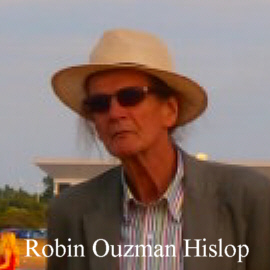
All the Babble of the Souk
All the babble of the Souk
all the life of the planet &
so little part of it, that I breathe
Posted by Poetry Life & Times on Saturday, 31 October 2015
Also available at Amazon.com All the Babble of the Souk Robin Ouzman Hislop
All the Babble of the Souk
By Robin Ouzman Hislop
Aquillrelle, 2015
Norman Ball, writer, author of Between River and Rock: How I Resolved Television in Six Easy Payments–
Before I get to the book itself, I’d like to offer up a confession. Robin and I have, over the years, engaged in some fascinating discussions on such far-flung topics as Big Bang contrarianism, the mystery of consciousness, theories of memes, multiverses, Popper falsifiability and vitalism, just to name a few; in short, the usual water cooler chatter. Or maybe not. Robin’s a whole lot smarter than me. Nonetheless it’s a lot of fun trying to keep up. If you’ll forgive a mixed metaphor, we’re odd ducks of a feather.
For one thing, Hislop is not averse to the occasional Latinate or ism getting tossed into a stanza. Of course poetical exploration of High Concept puts one at odds with the prevailing penchant for concrete image and tactile adhesives. There are many in poetry today who insist that, if you can’t say something nice about a spatula, a garden hose or a lamppost, you have no business trafficking in periphrasis. Everything must be grounded in the real, they say—as if such a thing as the real really existed. If I may say, oh prevailing sentiment in poetry, get real.
So, perhaps All the Babble of the Souk is not for everyone. But then, what of any value ever is? Poetry marches under a Big Spatula and we all can’t be flipping fried eggs and hash. Besides, in the hands of a deftly abstract mind, abstraction is not exactly a kick in the head. Nor will it break the yokes and spoil your breakfast. What is a speculative poetic excursion, after all, but high imagination and eccentricity commiserating via language? Let the arbiters of bric a brac catalog the quotidian like good flea marketeers. Such people are born to rummage about in the attic and log their heirlooms on eBay. Hislop doesn’t trammel their kiosks. He has Big Thoughts to mull.
Fresh off a personally intense eye-mind exploration , I found myself greatly predisposed to ‘Maps’, a four-piece series of poetic aphorisms that offers some dazzling insights into how we demarcate our space, time and existence, and especially how these elements are conveyed, if not even defined, by our senses:
-
Time links the auditory, the visual cortices on the retina which maps a fission between the unseen form of sound, the unheard sound of seeing
This notion of time having a real job to do immediately put me in mind of John Archibald Wheeler: “Time is what prevents everything from happening at once.” Hislop may be onto something even more subtle: Does time keep chaos at bay, allowing time for our disparate senses to marry their qualia into a coherent universe? Perhaps those with Synesthesia are more evolved creators of worlds, their gaps between sound and vision less discontinuous.
‘Maps’ delivered me to a speculation I wouldn’t have reached otherwise. And I find that’s a critical function of Hislop’s poetry. It gathers, then points away. More important than the resolved landing place is how it offers a hospitable ‘symposium’, couching philosophical fields of inquiry within poetic metaphor from which the reader’s own speculative arcs can then rise and take tangential flight; speculations feeding speculations. What does resolution ever resolve anyway? Conclusions are overrated. The concrete of the concretists doesn’t exist in a world:
-
Imposed as
an impression
seeking an ineffable concrete
in an abstraction
which defies location.—from ‘Red Butterflies’
Tumbling down rabbit holes beats rabbit stew any old day, especially when the universe may have us fixed for the next tasty, sentient bunny-in-line. In this sense I would call Hislop’s poetry inviting, intelligent, and refreshingly non-binding.
In ‘From Here to Silence, three’, he sets up a free will versus determinism tug-of-war stalked by Nietzschean recurrence and Leonard Susskind’s holographic 2D picture-show. You got a problem with that, Rod McKuen?
-
Say we are not sui generis
(the cause of yourself)
we are homeostatic holographs
dimensions in spectral parallel membranes
our near eternal process to err
along such a line we pass time in, time out
but could we not cheat the butterfly effect?
The stanza ends on the plaintive hope, reminiscent of Kafka that our cycle of error could end if freewill achieved grace but for an instant. Let us hope that moment arrives as I’m so tired of breaking my shoelace the day before Thanksgiving forever.
Am I losing the yucksters in all the heavy universe lifting? Not so fast. Hislop can be funny too. ‘At a Slant’ has a droll quality that still draws a snicker if for no other reason than that we’re stuck, all together (‘but it’s the same for all of us!’):
-
The con of life
the weirdness of its melodramatic sham
how good we are at yesterday, tomorrow
always better than before
like, being had – in the process by it.
The juxtaposed tenses of being had cement the interminable predicament we share. No exit. But at least we perfect our yesterdays until such time as we resume them anew, becoming rank amateurs all over again. But amateurs with a difference, with a modicum of acquired wisdom and an almost imperceptibly elevated rank. Okay, so it’s bleak, black humor. But there are shafts of light. One day, though maybe yet a half-eternity away, some butterfly will escape the dark matter of our descending shoe. (Butterflies pervade Hislop’s poetry.) We’ll be released to the next pristine universe armed with a butterfly-brain’s worth of hard-earned prescience. So yes, each successive Big Bang is not an unadulterated singularity. Some kernel of hard-earned wisdom gets borne through. Each new universe is a tooth on a slowly revolving gear that turns towards…perfection? In short, something barely better.
Since Hislop asks, that’s what—I think, I hope—may be ‘next’:
-
Pack, the near infinite
(in—the moment before you munch)
take a bit of the biscuit
before the Big Crunch
it’s an eternal packet
& having all, what’s next?—from ‘Lucky Hat Day’
All the Babble of the Souk will have you pondering your predicament in a whole new imaginative light. Reflect well my friend, as mindless impulsivity, and materialist inanity, is precisely what dangles this eternity over the interminable abyss. Therein may lie our paper-thin chance for freedom: by insect increment, one pardoned butterfly per eon at a time.
—Norman Ball
Editor’s note: for more of this Poet/Writer’s scintillating script please do not fail to overlook the hyper-text link eye-mind exploration included in the above review.

NORMAN BALL (BA Political Science/Econ, Washington & Lee University; MBA, George Washington University) is a well-travelled Scots-American businessman, author and poet whose essays have appeared in Counterpunch, The Western Muslim and elsewhere. His new book “Between River and Rock: How I Resolved Television in Six Easy Payments” is available here. Two essay collections, “How Can We Make Your Power More Comfortable?” and “The Frantic Force” are spoken of here and here. His recent collection of poetry “Serpentrope” is published from White Violet Press. He can be reached at returntoone@hotmail.com.
www.facebook.com/PoetryLifeTimes
www.facebook.com/Artvilla.com
robin@artvilla.com
editor@artvilla.com
http://www.aquillrelle.com/authorrobin.htm
http://www.amazon.com. All the Babble of the Souk. Robin Ouzman Hislop
www.lulu.com. All the Babble of the Souk. Robin Ouzman Hislop
Poetry Life & Times Interview with Poet R.W.Haynes
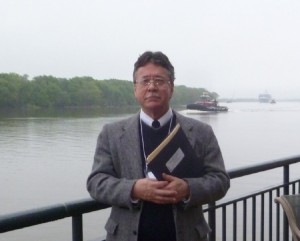
R.W. Haynes teaches at a university and writes about literature for academic publications. His doctorate at the University of Georgia (1991) was on sixteenth-century classicism in England. He has taught at Texas A&M International University in Laredo since 1992.
His teaching focuses on literature ranging from the Greeks to the English Renaissance, most of it dealing with medieval material and Shakespeare. Two more recent dramatists, Henrik Ibsen and Horton Foote, have been the focus of his attention in recent years. His book The Major Plays of Horton Foote (Mellen 2010) will be followed next year by an anthology of criticism on the same author.
Here at PLT we have had the privilege of featuring several of his poetic works both in classical & free style form. Intrigued by his background as well as his work in the field of poetry, we have included him in our list of special interviews at PLT, where I would like to begin by putting these questions. Hello RW welcome to our PLT interview. A few questions via Robin Ouzman Hislop Editor
PLT- Which was your first contact with poetry?
RW- Both of my parents were teachers, and both loved literature. My mother wrote poetry and encouraged her children to do the same. I had the honor of reading one of my mother’s poems at my sister’s funeral not long ago.
PLT- Which style in writing defines you?
RW- I’m not sure. It might be easier for someone else to answer that. There are some poetic projects I’d like to try which may be very different from what I’ve written so far. And does one write to be defined? Perhaps one writes to elude definition, at least at times. Remember what Hamlet says to Guildenstern, “Call me what instrument you will, though you can fret me, you cannot play upon me.” Not that I have any earth-shaking mystery in my poetic activity that it would be death to reveal. I do tend to work in more or less formal verse, which some editors and readers find insufficiently edgy or something. Different strokes. And not many of my poems have been long poems, possibly because of feebleness of mind. And sometimes the verse may be a bit angry, even though most of my sonnets are jokes to some extent. Well, anger demands expression, and, when it energizes a composition, that process governs the anger, I think, and wrath becomes something else, as it usually ought to do. To conclude the answer, I do what my Muse tells me to do, hoping all the while that writing about Downtown Waco or The Three Little Pigs or the Texas Campus-Carry legislation or the ghosts of people who aren’t dead yet isn’t some mad aberration arising from academic trauma or lack of tobacco or something.
PLT- Where is the germ of your creation? What triggers the poem?
RW- I join lots of poets in saying that the impulse to write is a constant presence. Perhaps it derives from a sense that language has a kind of magical potential to convey more in special moments than in ordinary ones. It isn’t always enough to yell “Caramba!” or to gasp “The rest is silence.” But let’s look at Shakespeare, whose sonnets show us something about how poetry does what it does. Can’t we say that in those poems there are motives we recognize with a distinct immediacy? Love, bitter disappointment, jealousy, humor, anxiety—all of which in their intensity are subjected to a presence of mind (if I may develop the usual sense of that phrase) and put before us as a kind of imaginative victory, if that is not too strong a word. So it seems to me that often the provocation to verse is a challenge to respond artistically to a moment deserving a poetic response. When the angel gives a command to Caedmon, he understands it is time for him to sing, despite his froglike voice.
PLT- Who were your educative poets?
RW- My mother, of course—Sarah Westbrook Haynes. My father also loved poetry. My older brother was, it seemed and still seems to me, a pretty good poet. Dylan Thomas, Pound, Eliot, Yeats. I majored in Classical Greek as an undergraduate largely because of Pound’s enthusiasm for Homer, but I also always read in the English poets, Chaucer, Spenser, Sidney, Donne. I liked the Romantics except for Wordsworth, whom I learned to respect at about the same time as I found I could read Wallace Stevens at last. I liked the work of a couple of poets, Marion Montgomery and Judith Ortiz Cofer, who were at the University of Georgia when I was there. Shakespeare finally became my job, and his work still amazes, and now as I write drama his skill seems even more unparalleled.
PLT- Do you handle an idea or an aesthetic intention when writing?
RW- I’m sure I try at times. Sometimes the ideas handle me. I won’t say the road to Hell is paved with aesthetic intentions, but I do think we need to reserve some modest disdain for glib or facile effusions that have nothing behind them but a kind of opportunistic exhibitionism. I like all kinds of poetry and poets, but not all poetry is equal in value. Do you remember Cinna the Poet in Julius Caesar? The crowd, infuriated by Caesar’s murder, seized him because one of the assassins was named Cinna. When he protested that he was a poet, the crowd tore him to pieces because of his bad verses. Perhaps the poet, like the blues musician, has to pay dues in one way or another before arriving at competence. On the other hand, youth, though sometimes blind or inconsiderate, can energize expression so much that impulse redeems immaturity and the claims of common sense appear pedantic. One doesn’t want to hear “I fall on the thorns of life!” every ten minutes, but Shelley’s “Ode to the West Wind” still opens a universe of poetic power.
PLT- What do you think of alternative resources for spreading poetical works?
RW- I’m for poetry, however access to it may be provided. Thank God for the Internet, which has done much to diminish the influence of certain kinds of editorial tyranny. I taught two classes today to begin the summer session, and in both I advised the students to write poetry, and I believe some of them took me seriously.
PLT- Do you think that poets, as such, have a special social commitment or that their sensitivity is more exposed to society´s predicaments?
RW- Life usually requires some toughness, no? I visited Poe’s grave in Baltimore a year or so ago, and, of course, it’s painful to reflect on gifted individuals whose artistic souls drive them through destructive experiences and social rejection. One thinks particularly of musicians, though the names of Hart Crane and John Berryman come to mind as well. It is good when such individuals find support and encouragement and can sustain life’s disappointments. Charles Baudelaire said that his humiliations were of the grace of God, and no doubt he derived comfort from that thought. As for social commitment, I’d like to think that a commitment to the pursuit of wisdom would suit poets very well. If we look at the political alignments of poets in the United States, I am sure that far more are Democrats than Republicans, but a review of history might indicate that such characters as the Beowulf poet, Chaucer, Spenser, and Shakespeare aligned themselves with political power to some extent, and no doubt the same was true of Homer. It was in fact reported that it was Caesar Augustus who prevented the posthumous burning of Vergil’s Aeneid. Now that was a patron of the arts. Despite these observations, however, it is also true that heartless greed and meretricious machination do not tend to promote poetic values. Though Lord Byron facetiously claimed to have discovered a new vice in avarice, his sponsorship of Hellenic freedom showed his true feelings. In so far as poets subscribe to humane values, to compassion and respect for their fellow humans, a social sympathy can be expected from them, but, surely, there is a considerable variety in human perspective. Would one expect an insurance executive such as Wallace Stevens to be a great poet?
PLT- Which was the last poetry book you read?
RW- I tend not to read books of poetry by individuals very often. I’m not sure why. It may be that I think I get more from works considered individually or in small groups than in a dense assemblage of poems. So the last book of poetry I read was probably Shakespeare’s Sonnets.
PLT- According to your criterion, what living poet should be re-read nowadays?
RW- Judith Ortiz Cofer, who is a native of Puerto Rico, but who has lived for many years in Georgia. Her work returns the reader to the personal by celebrating personal connections, the kind of sometimes casual devotion that shapes family and the caring individual. Those in search of new variations of insanity have many options, but Cofer’s poetry effectively engages a rare quest for an emotional responsibility which arises from a kind of harmony of verse and perspective.
PLT- Thanks RW for your amazing responses, I hope our readership following will be as profoundly impressed as I am. Also, I must admit, I’m a great fan of Wallace Stevens, him & Samuel Beckett in fact. And thank you again for your recommendation of Judith Ortiz Cofer, I’m intrigued, does she write in her original language, presumably Spanish? Could we entreat of you a sample of one of her works perhaps, and what that means to you and the title of any recommended publication.
RW- Judith Ortiz Cofer writes in English. A collection of her poetry is the volume Reaching for the Mainland & Selected New Poems, Bilingual Press 1995. Her poem “Esperanza,” which can be found at http://www.poetryfoundation.org/poem/240624 demonstrates her sense of the emotional implications of self-centered decisions. The young woman whose name means “Hope” is sketched in a few devastated lines as a person whose hope was cursed at her birth.
PLT- It wouldn’t be fair to wrap this Interview up without some further reference to your works other than those hitherto published here at PLT. So would you be so kind to leave us with one or more, perhaps a favourite of yours, if such a thing is possible.
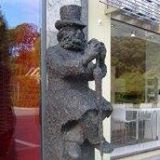
The Peacock Lady’s Declaration
The lady with glasses put her crutch aside
And said, “I get so sick of parasites
Who think that what a real writer writes
Just kind of bubbles up neatly from inside,
As she stares off in space, then grabs a pen
And puts together a story like a box
With little hinges, snaps, and locks,
And then goes back and puts the symbols in.
Of course, parasites are necessary,
And some of them are pleasant enough to be
Good company, at times, but mortality
Shouldn’t be orderly, at least not very;
Writing here, with these crumbling bones,
Makes new life sprout between inanimate stones.”
The Tomb of Edgar Poe (2014)
Looking for the conference hotel,
I drove by Poe’s grave. Tap tap…
One should definitely shudder a little
At a contact so nearly missed.
Later I walked back, passing by
The Everyman Theater, colder
Than I’m used to being, tap tap,
Down home on the Rio Grande,
-
And on his stone a twisted wreath
Of pasts and half-recalled regrets,
A ribbon, a spoon, a ball-point pen,
Declare our junkie solidarity again.
-
Why wasn’t some demented witch
Out front pouring green lemonade?
A lean, blue owl on her shoulder perched,
Staring as though I, too, were cursed.
Tapped out, forget that dark flower,
Return to harbor past the Bromo-Selzer Tower.
R.W. Haynes
robin@artvilla.com
PoetryLifeTimes
Poetry Life & Times
editor@artvilla.com
www.artvilla.com
Artvilla.com
